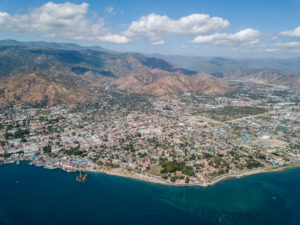Prior to CoST: Public infrastructure in context
According to Transparency International’s 2020 Corruption Perceptions Index, Timor-Leste scored 40 points and was ranked 86 out of 180 countries, an increase from 38 points and a ranking of 93 in 2019. Meanwhile, corruption is considered a significant issue when it comes to doing business in Timor-Leste: the 2019 World Bank report Ease of Doing Business placed the country 181 out of 190 countries.
While the government faces challenges in the fight against corruption and mismanagement in infrastructure, there are opportunities to overcome some of these. This includes placing greater emphasis on transparency, accountability, integrity, and efficiency in public expenditure through legal and policy means. Creating an integrated, national anti-corruption strategy which allows the public to track public expenditure will also help build strong preventative measures.
CoST Timor-Leste: How it all began
Timor-Leste joined CoST in 2019 as part of the CoST competitive process. Timor-Leste’s membership application was spearheaded by the Ministry of Public Works, the government body responsible for oversight of projects such as such as roads, bridges, and urban planning. Interest from the Government of Timor-Leste was initially sparked by the potential to develop an online disclosure platform, and its ability to tackle the fore-mentioned transparency challenges.
In early September 2019, the Ministry of Public Works consulted numerous relevant institutions about the applicability of CoST principles and opportunities to adopt them in Timor-Leste. The first interim Multi-Stakeholder Group (MSG) meeting was conducted soon-after, and was attended by representatives from the public and private sectors, industry membership bodies and non-governmental organisations, including those with focus on women and people with disabilities.
Disclosure in Timor-Leste
Timor-Leste has pre-existing online portals designed to manage and monitor procurement around public works. The National Development Agency (ADN), National Procurement Commission (NPC) and Major Project Secretariat (MPS) all have online systems in place. However, most of the data on these systems is not publicly available and in many cases is not up to date. Limited access to procurement information reduces public interest and discourages participation in monitoring public investments, reducing accountability around the issues which can arise from poorly managed investment. The Government of Timor-Leste is keen to heighten its accountability with a focus on increasing the quantity and quality of data disclosed. Having studied disclosure practises in Honduras, the Ministry of Public Works is seeking to emulate this with simple and accessible disclosure in line with the Open Contracting for Infrastructure Data Standard.
Get in touch
CoST Timor-Leste Programme Manager
Anderias Tani
timor-leste@infrastructuretransparency.org